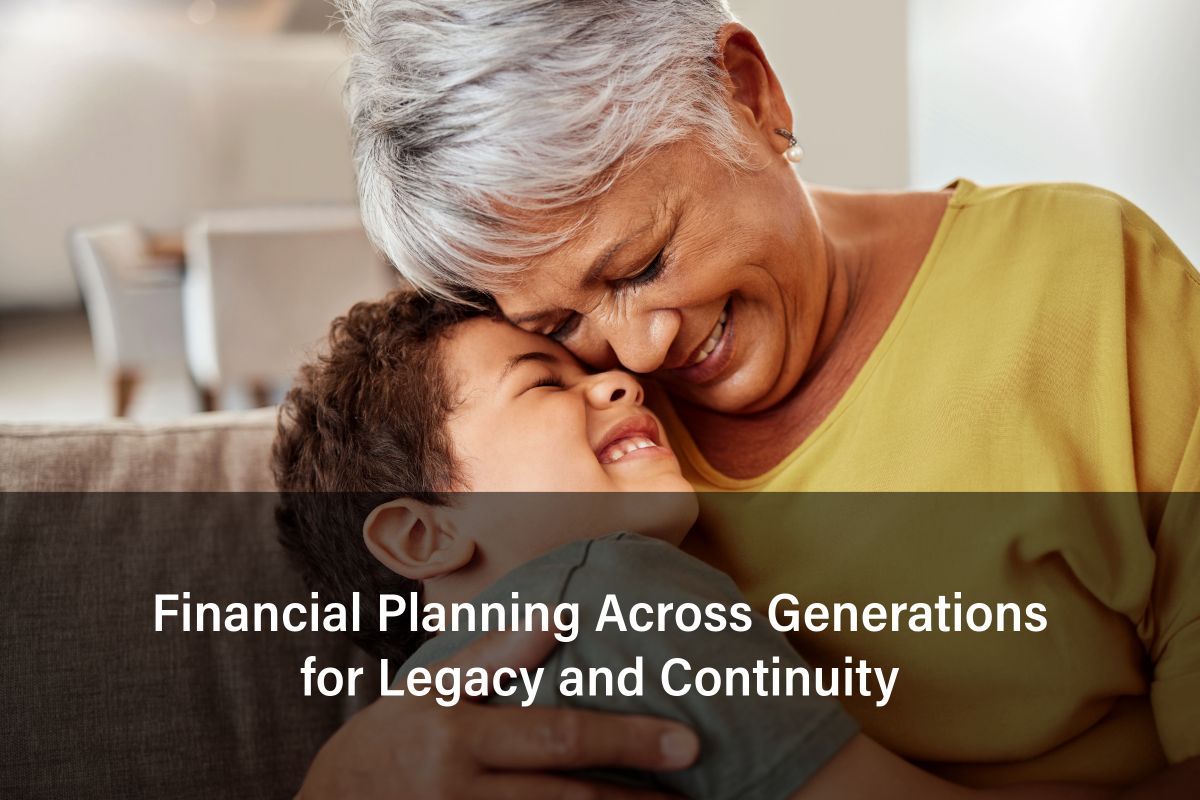Financial Planning Across Generations for Legacy and Continuity

When it comes to financial planning, a long-term perspective can be particularly meaningful. Financial planning across generations is about more than managing assets; it’s about creating a lasting legacy and ensuring continuity for loved ones. Families today increasingly recognize the importance of planning strategies that bridge generational gaps and foster financial resilience, allowing wealth, values, and goals to be passed on in ways that support continuity. Here’s how multigenerational planning can help families achieve these goals and what it entails.
Understanding Multigenerational Financial Planning
Multigenerational financial planning is a holistic approach that considers the financial needs, objectives, and values of each generation in a family. By working collaboratively, families can identify and address potential financial gaps, create long-term strategies, and cultivate shared values around wealth management. This proactive approach offers several advantages, including the opportunity to pass down financial knowledge, preserve family wealth, and facilitate smooth wealth transfers.
For a truly effective legacy plan, it’s essential to integrate the perspectives and priorities of each generation involved, from younger family members who may just be starting their financial journeys to older members focused on preserving assets and passing them on. Financial advisors play a vital role in guiding families through this process by helping them identify key priorities, design personalized strategies, and make informed decisions.
Key Components of Multigenerational Financial Planning
Open Communication About Goals and Values
One of the most important aspects of generational financial planning is open communication. Encouraging family discussions about financial priorities and values allows each member to voice their goals, expectations, and concerns. Whether it’s saving for educational expenses, managing healthcare costs, or supporting philanthropic endeavors, a shared understanding of each person’s objectives enables families to build a plan that reflects collective values and addresses individual needs.
Estate and Legacy Planning
Estate planning goes beyond simple wealth transfer; it also involves defining how assets should be managed to align with family values and goals. A well-structured estate plan can provide clear directions on inheritance, charitable contributions, and business succession while minimizing potential conflicts. Trusts, wills, and other legal structures can help families control how assets are distributed, mitigate tax liabilities, and potentially create enduring financial security for future generations. Regularly updating estate plans is also essential as family circumstances and laws evolve.
SEE ALSO: Estate Planning for Business Owners: Fostering a Legacy Beyond Retirement
Incorporating Tax Strategies
Taxes can significantly impact the long-term value of a family’s wealth. By implementing tax-efficient strategies, families can help preserve assets and enhance the legacy passed on to future generations. For instance, strategies such as gifting, utilizing tax-deferred investment accounts, and taking advantage of estate tax exemptions can help reduce tax burdens and facilitate smoother transfers of wealth. Regularly consulting with a tax advisor is crucial to stay updated on the latest regulations and opportunities.
Retirement Planning for All Ages
Retirement planning is a continuous process that benefits from a multigenerational perspective. For younger family members, it may involve establishing and contributing to retirement accounts early to take advantage of potential compound growth. For those nearing retirement age, strategies often focus on income distribution, healthcare costs, and managing assets to support a lasting retirement. Each generation can benefit from guidance on retirement planning, particularly when these efforts are aligned to support both individual goals and family objectives.
Philanthropy and Social Impact
Many families seek to create a legacy of giving by incorporating philanthropic goals into their financial plans. This can include establishing family foundations, donor-advised funds, or other charitable vehicles that support causes meaningful to the family. Philanthropic planning not only allows families to give back but also fosters shared values and strengthens family bonds. Involving younger generations in these efforts can instill a sense of purpose and responsibility toward long-term financial stewardship.
Education and Financial Literacy
Knowledge transfer is as essential as wealth transfer in multigenerational planning. Educating younger family members on financial concepts—such as budgeting, investing, and debt management—prepares them to make informed decisions and manage wealth responsibly. Many families incorporate regular financial literacy sessions into their planning process to equip future generations with the tools and knowledge needed for successful financial management.
SEE ALSO: Exploring Trusts for Wealth Preservation After Retirement
Building a Family Legacy with Professional Guidance
Navigating the complexities of multigenerational financial planning requires careful coordination, and families often benefit from working with financial advisors who specialize in these strategies. A financial advisor can provide personalized guidance and insight to align a family’s wealth management practices with their values and objectives. By helping families develop and implement a comprehensive plan, advisors support families in building legacies that endure across generations.
The Benefits of a Thoughtful, Inclusive Approach
Planning for legacy and continuity is not only about preserving wealth but also about nurturing a shared vision for the future. A thoughtful approach allows families to support one another’s financial well-being, reinforce values, and prepare the next generation for responsible financial stewardship. This comprehensive strategy helps ensure that the legacy created today can continue to benefit future generations, fostering both financial stability and a lasting sense of purpose.
Final Thoughts on Financial Planning Across Generations
Multigenerational financial planning can be an invaluable tool for families aiming to achieve a harmonious balance between individual aspirations and family-wide goals. By incorporating open communication, thoughtful estate planning, tax strategies, retirement planning, philanthropy, and financial education, families can create a foundation for legacy and continuity that endures through the years. The result is a legacy that reflects the values and vision of the family, providing future generations with a roadmap for sustainable financial well-being.